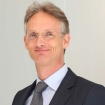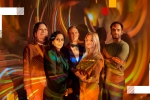
Jeroen Dijst on his role as CRO of de Volksbank
In 2015 Jeroen Dijst (51) started as chief risk officer at de Volksbank. He began ad interim, but got a permanent appointment as CRO after six months. Meanwhile, seven years have passed and Dijst has gained plenty of new insights and experiences in his work. In conversation with PwC partner Anthony Kruizinga, he talks about his profession as a risk manager, but also about external developments such as the gap between rich and poor and the importance of monitoring the human dimension.

Jeroen Dijst
Clearing your head in between meetings
Dijst grew up in Purmerend and still lives there with his wife and two teenage children. In the surroundings of the Beemster polder, you can enjoy being outdoors. ‘One of the things I have continued from the COVID-19 period is going out on my racing bike every day. Relaxation through exertion, which allows you to clear your head. After a bike ride, the bits of the puzzle fall into place’.

Having a certain structure in your working day works very well for Dijst. ‘Just as I enjoy having breakfast with my family every morning and having the first meetings online. Then I usually go to the office or to an appointment. I prefer to avoid the rush hour. And I try to find time every day to get on my bike and go for a ride. That can sometimes be done in between meetings.’
Kruizinga: ‘I understand Jeroen’s liking for the outdoors. I myself enjoy walking the dogs. Being outside is a great way to clear your head.’ Kruizinga has known Dijst since he joined de Volksbank. ‘We meet regularly and have good personal contact. Together we made a number of trips abroad to speak with CROs from other banks, for inspiration.’
‘I know what it is like to live on very little’
De Volksbank is the parent company of SNS, ASN Bank, RegioBank and BLG Wonen. The website features Dijst's slogan: ‘Making money from money, there's so much more to banking than that’. But what exactly does de Volksbank mean by this? Dijst: ‘The difficulty of banking is holding out financial prospects for people who do not have much money. That is far more complicated than making more money by having money. You want these people to create opportunities and have financial peace of mind. Especially now, with rising energy prices. De Volksbank always tries to operate on a human scale based on ‘shared value’: for the customer, the employee, society and the shareholder.’
Kruizinga: ‘Has that become even more important in the course of your career, that you take into account not only the people who already have enough money?’ Dijst: ‘It has to do with your background. I come from a working-class Amsterdam family. We had, as they say, ‘not a penny to spare’. Our annual holiday went no further than the campsite in Valkenswaard just an hour and a half away. I know what it is like having to make ends meet with few resources. But in the end, you make more of an impact if you can hold out a new prospect for a customer who has run into financial difficulties through no fault of their own so that they can continue to live in their home without worry. As a bank, you should also be able to help someone through a more difficult period when you start talking to each other. We’re already actively going in this direction. We don't want to rush customers right away. We always want to preserve the human dimension. You become the best bank not by having a sizeable balance sheet, but by the way you treat each other. You want to feel confident when you apply for credit. You prefer to do that with someone who lives close by and is approachable, who really knows you. First the human aspect, then the money.’
‘Windmills and solar parks, we are familiar with them by now’
But how do you get people who are going through a difficult period back on track? According to Dijst, this starts with small measures. ‘By first looking at what they spend a lot of money on. You want to make them feel competent, by giving them insight, overview and putting them at ease. De Volksbank and its brands help to achieve this by, for example, not threatening customers when they have payment arrears and not working with collection agencies. We stand alongside our customers and not opposite them. I see that in the Dutch banking landscape, we occupy a distinctive social position in terms of customer friendliness. With our three brands RegioBank, SNS and ASN Bank, we occupy the top three positions. But also the Duurhuur pilot (possibility for people paying an expensive rent over a longer period to obtain a mortgage) that BLG Wonen started with NHG received an InFinance Golden Lotus Award. Our customers feel that we consider carefully the way we bank and that we take account of their sensibilities. But it goes without saying that we don't want to be just good at customer service. We are also committed to sustainability, quality of life and making good living possible for everyone. We want to go beyond the financial optimisation of our own balance sheet.’
Kruizinga: ‘Sometimes you take risks by wanting to meet all those goals, don’t you?’ Dijst: ‘Yes, I only need to look at the key risk indicators (KRIs) that we have to see that they cover all the shared values. There are many KRIs in the areas of customers, employees and society. Not only to report on externally, but also internally. As an organisation you should pay attention to energy labels of the homes to be financed and even factors such as biodiversity. By doing so you show that you are exploring new areas that others have not yet seen. Windmills and solar parks, we are familiar with them by now. But what is the next step in combating climate change? No one has yet taken it. You must therefore be prepared to adjust your risk appetite if you want to be innovative. It's exciting and ambitious, but we’re going for it.’
Taking unpredictability into account
As a CRO, you can anticipate a lot, but you can’t control everything. Dijst knows this all too well, more than two years after a global pandemic broke out. ‘Who could have imagined more than two years ago that COVID-19 and the war in Ukraine would play such a major role in the strategy of a financial institution? I was reminded of the well-known black swan theory, because few risk managers had reckoned with a war in Europe and a pandemic. It says something about how quickly you should be prepared to change your risk profile and make adjustments. Agility is in fact also a risk indicator; you have to adapt quickly enough to the new situation.’

‘De Volksbank customers have not yet been directly affected by the war in Ukraine. We focus on retail and SMEs in the Netherlands’, says Dijst. ‘The signs are that they have not yet been directly impacted by the war, perhaps only in the near future through second-order effects such as rising inflation and rising interest rates. We have, however, learnt that you have to adjust quickly. After all, the situation in Ukraine is again causing a lot of unpredictability. And a risk manager knows: predicting is difficult, especially when it comes to the future.’
‘See myself as an opportunity manager’
Kruizinga: ‘So you take several factors into account when it comes to risks. How about in your private life? Are you risk averse there?’ Dijst: ‘I am more risk-averse in my work than in my private life. In my private life I like to take risks, by cycling and driving a fast car. I once learnt that in the Chinese language the word ‘risk’ consists of two characters. One is ‘danger’, as we often know it. But the other meaning is ‘opportunity’. In the Western world, we only look at dangers when we talk about risk. But in Asia and America they look at it more optimistically. I sometimes like to say that I am an ‘opportunity manager’ rather than a ‘danger manager’. That sounds much nicer. If you manage only on the basis that nothing is allowed, it becomes tedious and negative.’

And how does Dijst see his own future as a risk manager at de Volksbank? ‘I find it a unique opportunity to be able to do banking in the broadest sense of the word at de Volksbank. I also have the opportunity to be a teacher because of this job. I have already done that for my own children, and we also go to secondary schools and secondary vocational education institutions. Those lessons are about what money really is. If your upbringing has taught you something about money and how to handle it, you are less likely to get into trouble later. Making a social impact is very important to me. I can put my ambition to good use. What will I be doing in five years? Well, I didn't know five years ago whether I would still be here. My focus is on de Volksbank. That still gives me a lot of energy.’
Contact us



















